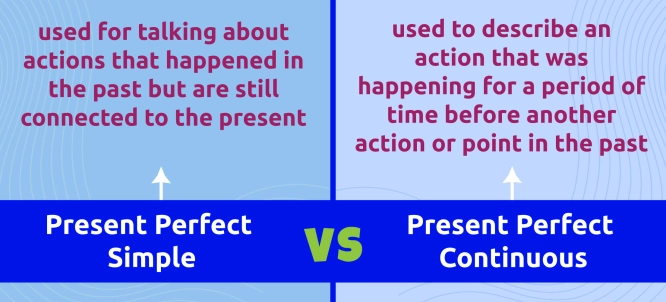by PushtoLearn
Present Perfect Simple and Present Perfect Continuous
Table of Contents
Present Perfect Simple vs. Present Perfect Continuous – Exercises
These exercises focus on Present Perfect Simple vs Present Perfect Continuous
What Are Present Perfect Simple and Present Perfect Continuous?
Present Perfect Simple
The Present Perfect Simple describes actions that:
-
Happened at an unspecified time in the past but have a result now.
-
Were completed recently or over a period up to the present.
Structure:
Subject + have/has + past participle
Examples:
-
I have finished my homework.
-
She has visited Paris three times.
Present Perfect Continuous
The Present Perfect Continuous describes actions that:
-
Started in the past and are still happening.
-
Happened repeatedly or recently and continue to have an effect now.
Structure:
Subject + have/has + been + verb(-ing)
Examples:
-
I have been studying for three hours.
-
They have been working on this project all week.

Rules and Key Differences
|
Feature |
Present Perfect Simple |
Present Perfect Continuous |
|
Focus |
Result of an action |
Duration or ongoing nature of an action |
|
Time Expressions |
"already," "yet," "ever," "never," "just" |
"for," "since," "all day," "lately," "recently" |
|
Type of Action |
Completed actions or repeated experiences |
Ongoing actions or actions with visible effects now |
|
Examples |
I have read this book twice. |
I have been reading this book for two hours. |
Common Errors
Present Perfect Simple Errors
-
Using a past time expression with the Present Perfect Simple:
-
Incorrect: I have finished my homework yesterday.
-
Correct: I finished my homework yesterday.
-
Wrong verb form:
-
Incorrect: She has went to the store.
-
Correct: She has gone to the store.
Present Perfect Continuous Errors
-
Using it for completed actions:
-
Incorrect: I have been finished the project.
-
Correct: I have finished the project.
-
Forgetting the auxiliary verb "been":
-
Incorrect: He has working all morning.
-
Correct: He has been working all morning.
When to Use These Tenses in Everyday Life
Present Perfect Simple
-
Talking about experiences:
-
I have traveled to Japan.
-
Describing recent events with a result now:
-
He has lost his keys, so he can’t get inside.
Present Perfect Continuous
-
Talking about ongoing activities:
-
We have been waiting here for an hour.
-
Emphasizing duration:
-
She has been learning English since 2019.
FAQs About Present Perfect Simple and Continuous
What is the main difference between Present Perfect Simple and Present Perfect Continuous?
-
The Present Perfect Simple focuses on the result of an action.
-
The Present Perfect Continuous focuses on the duration or ongoing nature of an action.
Can I use them interchangeably?
No, because they highlight different aspects of the action. For example:
-
Present Perfect Simple: I have written three emails. (focus on result)
-
Present Perfect Continuous: I have been writing emails for two hours. (focus on duration)
What are common time markers for these tenses?
-
Present Perfect Simple: "ever," "never," "just," "already," "yet."
-
Present Perfect Continuous: "for," "since," "lately," "all day."
Can I use "been" with both tenses?
Yes, but differently:
-
Present Perfect Simple: She has been to Paris. (experience)
-
Present Perfect Continuous: She has been studying all morning. (duration)
How do I make these tenses negative?
-
Present Perfect Simple: Add "not" after "have/has."
-
Example: I have not finished my work.
-
Present Perfect Continuous: Add "not" after "have/has."
-
Example: I have not been working lately.

